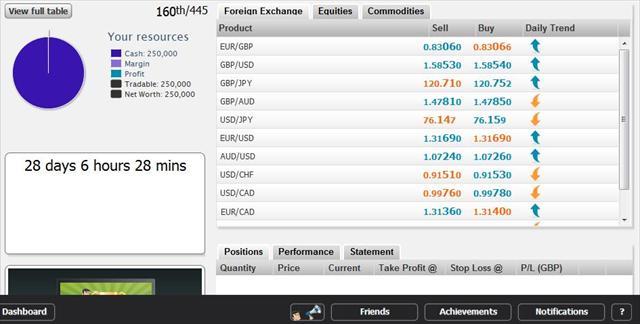TraderPlay Review
 Game: TraderPlay
Game: TraderPlay
Developer: TraderPeople
Publisher: Copperdime Ltd
Available on: PC/ Mac
In the past few years, the financial industry has had a pretty bad reputation, justifiably so, you might argue. Whatever your opinion, the online financial market is growing rapidly, with banks and other companies offering your Average Joe a platform to play with financial instruments. TraderPlay, a new online game, is one of many platforms for Joe to do this with virtual money; complete with the opportunity to win real money for good performance.
At first glance, TraderPlay is very ergonomic with a sleek, modern design. Cartoon figures of businesspeople add to the fun-factor and keep the game light and entertaining. Help for beginners, however, is hard to initially find. It is difficult to know where to begin if you’re starting out as a finance newbie. As this uses virtual money, this means that at least you won’t lose any of your hard-earned dosh due to these problems. TraderPeople’s “TraderVersity“, plugs this gap; but does take some rooting around to find.
There are three financial instruments that players can utilise:
- Equities – prices of stocks, shares in companies
- Foreign exchange – ratios of pairs of currencies, called “FX” or “Forex” in the financial industry
- Commodities – prices of oil, gold etc.
Stocks and shares you may be more familiar with, essentially you are betting on the values of individual bits of companies. A company does well, stocks go up, and vice versa. Foreign exchange you may be less familiar with, this involves betting on the movement of pairs of currencies. For example, if I think that the UK’s economy will do well this month (unemployment will lower, say) and that the Japanese economy will do badly (high trade deficit, say) then I also concurrently think that the GBP/JPY pair will go up, so I execute a buy order on the GBP/JPY pair.

In the game itself, the platform focuses on you and your friends joining up, trading, and comparing your winnings with others. The social aspect is strong, as players can link the game with their Facebook accounts. There are many competitions too, the main one being the monthly “Trading Fun” competition, ranking players globally by winnings. These are a positive feature, an incentive for you to learn more about trading and show off on the leaderboards.
Trading itself is a simple action, you can easily pick and choose financial instruments and executive orders quickly. Since this is virtual money, there are no legal obligations for the platform to use brokers, so the speed is accentuated. One negative I have to draw from the platform is its emphasis on short-term trading. The charts used move very quickly, and are suited to those with a taste for instant gratification. The ‘daily trend’ for each instrument (up/down) is incredibly vague too as there is no explanation or time scale used. This is bad for beginners and meaning that only those experienced in finance or with advanced charting software will be able to understand the platform’s interpretations of trend easily.

One must remember that this game is still in its infancy, and the game offers a very open and clear way to give the developers feedback on game features they’d like to see. It’s definitely a positive to have open-minded developers. When playing, I strongly urge you to take advantage of this!
While there are certainly positives to this new game, there are still more ergonomic platforms out there, such as eToro which focuses on foreign exchange, and has a secondary platform for virtual money trading without the risk of losing your money. However, one unique advantage TraderPlay does offer is its exclusive focus on virtual money, this gives it more legitimacy as a game, drawing away from the money-making aspect of trading. Ironically, most traders I’ve met from investment banks view ‘real-life’ trading as a game itself.
VERDICT: Do try out this free game; with nothing to lose and potentially a lot of money to win, beginners to finance can learn about trading. Those more serious about finance would do better to try out the secondary virtual platforms of some brokers’ trading platforms.





